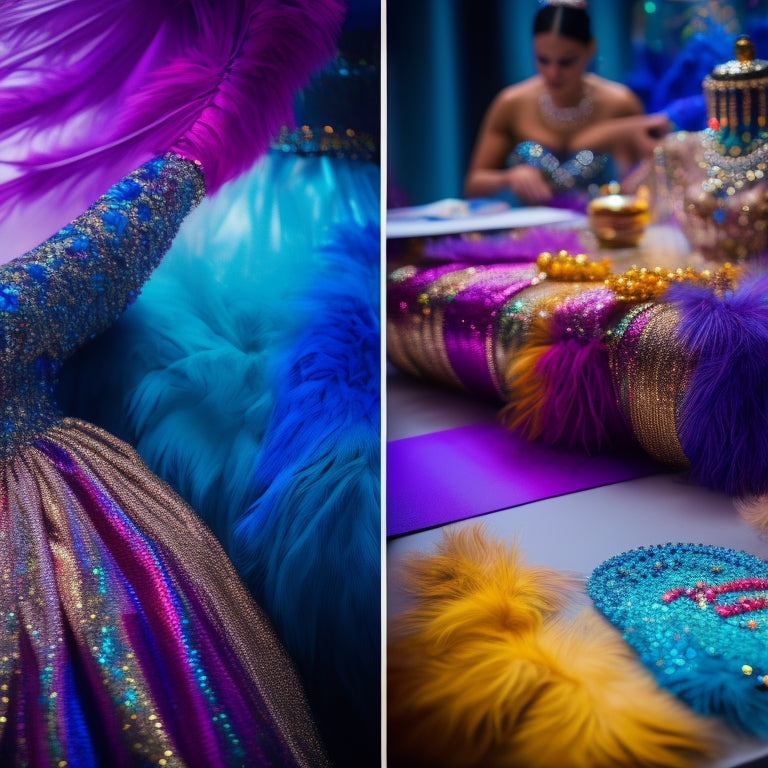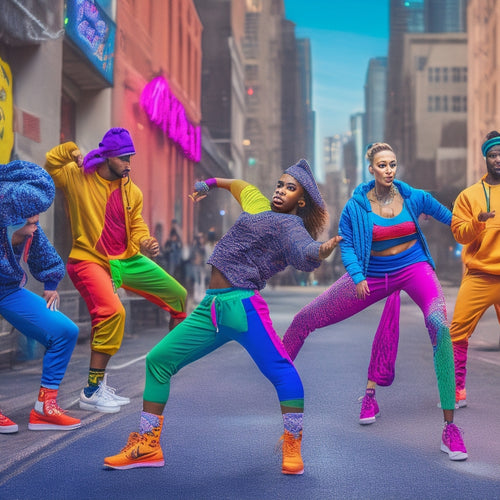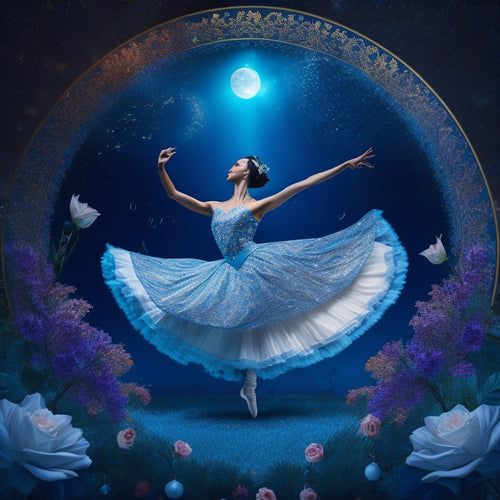
What Are the Dance Costume Design Secrets You Need to Know
Share
When designing dance costumes, choose unique fabrics that enhance movement, like breathable spandex or flowing silk. Prioritize comfort and flexibility; your costume should feel like a second skin, allowing for free expression. The fit is vital, as ergonomic cuts improve your grace on stage. Consider color palettes carefully; they evoke emotions and set the tone for performances. Durability is key too—opt for materials that withstand repeated use while maintaining their charm. Each choice you make weaves a story that engages audiences, and there's so much more to uncover about bringing your vision to life.
What You Need to Know
- Selecting the right fabrics enhances movement and flexibility, ensuring costumes feel like a second skin for seamless performance.
- Incorporating unique and sustainable materials not only elevates the aesthetic but also supports environmental responsibility in costume design.
- A well-considered color palette influences a dancer's stage presence and emotional impact, enhancing audience engagement.
- Customized cuts and ergonomic designs improve expressiveness and grace, allowing costumes to flow naturally with the dancer's movements.
- Prioritizing durability and wrinkle-resistant fabrics ensures costumes maintain their fresh appearance and longevity through repeated performances.
Unique Fabric Options Available
When it comes to dance costumes, choosing unique fabrics can change your vision into reality.
You'll want to investigate sustainable materials that not only feel great but also align with eco-friendly practices, such as eco-friendly sourcing that reduces environmental impact.
Additionally, experimenting with textures like shimmering silk or glitzy metallics can create visual intrigue that engages the audience.
Let's brainstorm together to find the perfect fabric that showcases your dancers' artistry!
Sustainable Material Choices
In the world of dance costume design, many innovative fabric options are now emerging that prioritize sustainability without sacrificing style. You can investigate eco-friendly fabrics that not only look stunning but also support the planet.
Think about incorporating biodegradable options, which break down naturally, reducing waste in landfills. Recycled materials are another fantastic choice, converting discarded textiles into beautiful costumes that tell a story.
When selecting your fabrics, consider ethical sourcing practices. Opt for organic textiles that avoid harmful chemicals, ensuring the safety of both dancers and the environment.
Pair these with sustainable dyes, which minimize water usage and pollution, adding vivid colors without the hefty carbon footprint. Low impact production methods further enhance your design, showcasing your commitment to responsible craftsmanship.
By choosing these sustainable materials, you can create dance costumes that connect with a message of environmental consciousness and artistic freedom.
Textures and Patterns Exploration
Exploring textures and patterns can change your dance costumes into enchanting visual statements. When you immerse yourself in the world of fabric, think of how pattern mixing can create a lively look that captures your audience's attention.
Imagine combining bold stripes with delicate florals; the contrast can evoke energy and grace simultaneously.
Texture layering is another powerful technique. By incorporating different materials, like soft chiffon over structured tulle, you can create depth and movement. As you twirl, the layers will dance around you, enhancing every performance.
Don't shy away from experimenting! Consider sequined fabrics for a touch of glamour or matte finishes for a more subtle elegance.
When collaborating with designers, share your vision—allow your personality to shine through the textures and patterns you choose.
Remember, the freedom to express yourself lies in those unique fabric options. Whether you opt for lively prints or understated hues, the right combination can change your dance costume into a stunning masterpiece that speaks to your artistic essence.
Welcome the adventure of exploration and let your creativity lead the way!
Enhanced Movement and Flexibility
When it comes to dance costume design, fabric choice isn't just about aesthetics; it's essential for your movement.
Selecting breathable fabrics like cotton and mesh not only promotes airflow but also supports proper fabric selection for ideal performance.
Opting for materials that stretch and breathe allows you to express every detail of your performance without restriction.
Plus, a customized cut that fits your body perfectly enhances your flexibility, making each leap and turn feel effortless.
Fabric Choice Matters
Choosing the right fabric for dance costumes can greatly enhance your movement and flexibility on stage. The performance of the fabric is essential; it should stretch and breathe, allowing your body to express every detail of your choreography without restriction. Think about materials like spandex or lycra, which hug your form yet provide the freedom you crave.
When collaborating with designers, consider how dye techniques can add depth and dimension to your costume. Lively colors can reflect your energy, while softer hues might evoke a more ethereal quality. However, remember that the way a fabric reacts to dyes can also impact its performance. Some fabrics may lose elasticity or texture after dyeing, so always test samples before committing.
Balancing aesthetics with functionality is key. You want to look stunning, but if your costume hinders your movements, it defeats the purpose.
Talk to your fellow dancers and designers about their experiences with different fabrics. Share perspectives and learn from each other's successes and challenges. Ultimately, choosing the right fabric is about creating a costume that enables you to dance freely and expressively.
Cut and Fit
Crafting the perfect cut for a dance costume can change your performance, allowing for improved movement and flexibility. Think about how customized silhouettes hug your body, emphasizing your lines while giving you the freedom to express yourself fully.
The right design can make all the difference, letting you glide through each step without restriction. When you consider ergonomic cuts, you're prioritizing not just aesthetics but functionality as well. A costume that fits well will move with you, not against you.
Imagine stepping onto the stage, feeling the fabric flow with your every leap and turn. That's the beauty of a well-cut costume—it becomes an extension of your body.
As you collaborate with designers, communicate your needs clearly. Emphasize the importance of comfort and freedom. Discuss how specific cuts can enhance your unique style and performance.
Whether you prefer a fitted bodice or a flowing skirt, the right cut can uplift your dance, allowing for uninhibited expression. In the world of dance, every detail counts. Prioritize cuts that celebrate your movement, ensuring you not only look stunning but feel enabled every time you take the stage.
Design Elements Uncovered
When it comes to costume design, the right color palette can alter a dancer's presence on stage, capturing the audience's imagination.
A thoughtful balance of warm and cool tones can evoke different emotions, enhancing the overall impact of the performance.
You'll want to reflect on how fabric texture not only affects movement but also enhances the visual experience, adding depth to the performance.
Incorporating mood boards for color cohesion can help visualize how these elements work together to create costumes that truly shine.
Color Palette Selection
A well-chosen color palette can change a dance costume from ordinary to extraordinary, setting the tone for the entire performance. When selecting colors, explore color theory to understand how they interact and their emotional impact.
Think about the feelings you want to evoke—warm hues can ignite passion, while cool shades can bring calm. By blending contrasting hues, you can create visual tension that captures the audience's attention.
Consider seasonal trends; spring might inspire soft pastels, while autumn could call for rich earth tones. Color symbolism also plays a key role; red can signify love or danger, while blue often represents tranquility or sadness.
As you collaborate with dancers and choreographers, confirm your color choices align with their vision, enhancing the overall theme.
Remember that audience perception is essential; colors can influence how they interpret the performance, so choose wisely. Adopt color psychology to create a palette that strikes a chord deeply, nurturing a sense of visual cohesion throughout the costume design.
With the right colors, you're not just dressing dancers—you're weaving emotion into every movement, altering the stage into a lively canvas of expression.
Fabric Texture Importance
Often overlooked, fabric texture plays an essential role in dance costume design, influencing not only the visual aesthetic but also the dancer's performance. When you choose materials, consider how texture contrast can uplift your costume. Pairing soft, flowing fabrics with structured elements creates lively movement on stage, enticing the audience's eye while allowing freedom of expression for the dancer.
Tactile appeal is equally important. Fabrics like chiffon and silk offer a delicate touch that enhances gracefulness, while something more sturdy like velvet or denim can provide support and structure. This balance can reshape a dancer's confidence, making them feel enabled and comfortable in their movements.
Don't shy away from experimenting with different textures. Layering various fabrics can add depth and richness to your design, inviting the audience to engage with the costume on a sensory level.
Think about how each material interacts with light, movement, and touch, creating a visual feast that tells a story. Incorporating thoughtful fabric choices not only enhances the overall aesthetic but also respects the dancer's need for freedom, allowing them to shine in their performance.
Selecting Based on Performance Style
When choosing a dance costume, it's crucial to think about the specific genre you're performing in, as each style has its own vibe and requirements.
For instance, ballet-inspired costume design features delicate tulle skirts and intricate bodices that enhance the grace of the performance.
You want to balance aesthetic appeal with comfort and mobility, ensuring you can express yourself freely while enchanting your audience.
Let's investigate how these elements come together to enhance your performance.
Understanding Dance Genres
Selecting the perfect costume for a dance performance hinges on understanding the unique characteristics of each dance genre. Immerse yourself in ballet costumes, where elegance and structure reflect the art's grace.
For contemporary styles, think about how modern interpretations can blend fluid lines with innovative fabrics, enhancing the performance aesthetics.
Jazz influences call for lively colors and playful designs; opt for tap attire that allows for sound and movement to shine.
Don't forget hip hop, where streetwear elements and bold statements capture the genre's energy and cultural significance.
When working with traditional garments, consider how they can be reimagined to meet choreographic needs while respecting their origins.
Each genre tells a story, and your costume plays an essential role in that narrative. Collaborate with choreographers to guarantee your choices connect with the intended expression, balancing personal freedom with the performance's vision.
Comfort and Mobility Factors
In the domain of dance, comfort and mobility are essential elements that can make or break a performance. When selecting your costume, consider how your outfit enhances your movements and supports your artistic expression. Breathable materials are key; they keep your body temperature regulated, allowing you to focus on your dance rather than discomfort.
Here's a quick guide to help you choose wisely:
| Performance Style | Recommended Fabrics | Key Features |
|---|---|---|
| Ballet | Cotton, Lycra | Flexibility, breathability |
| Hip Hop | Spandex, Mesh | Stretch, moisture-wicking |
| Contemporary | Bamboo, Jersey | Softness, temperature control |
Your costume should feel like a second skin, moving seamlessly with you. As you dance, verify each material choice supports your freedom of movement. Remember, the right balance of style and comfort can enhance your performance and enthrall your audience. Accept the freedom that comes with choosing costumes designed for mobility, and let your creativity shine through every leap and turn.
Durability for Repeated Performances
When you're designing costumes for repeated performances, choosing the right fabric is key to ensuring longevity and resilience.
Consider incorporating elements of costume quality that not only enhance the aesthetic appeal but also maintain functionality.
Think about materials that can withstand the rigors of movement and frequent washing, like spandex or nylon blends.
Fabric Selection Tips
Often, dancers find themselves in the spotlight night after night, so choosing the right fabric for their costumes is vital for both performance and durability.
Start by considering fabric weight; heavier fabrics might withstand more wear, but they can restrict movement. Opt for lightweight, breathable materials that allow freedom and comfort, especially during long performances.
When it comes to fabric layering, think about how different textures and weights can enhance your costume while maintaining breathability. You can add flair with fabric embellishments, but make sure they don't compromise durability or comfort.
Sourcing the right fabric is essential—keep an eye on current fabric trends that balance style with performance needs. You want fabrics that aren't only visually stunning but also affordable and easy to maintain.
Look for blends that resist wrinkling and fading, keeping your costumes looking fresh even after multiple shows.
Prioritize fabrics that can endure the rigors of repeated performances while still allowing you to express your artistry.
Frequently Asked Questions
How Do I Choose Colors That Enhance My Performance?
Choosing colors for your performance? Think about color psychology; lively hues enhance energy and audience connection. Prioritize performance visibility—select shades that pop under stage lights, enhancing your expression and inviting freedom in your movement.
What Budget Should I Set for a Dance Costume?
When setting a budget for your dance costume, consider costume materials and design inspiration. Collaborate with fellow dancers to share costs and ideas, ensuring you create something that reflects your unique style without breaking the bank.
How Can I Incorporate Personal Style Into My Costume?
To incorporate your personal style into your costume, focus on fabric selection that connects with you. Choose colors and textures that reflect your personality, allowing for personal expression while collaborating with designers to create something uniquely yours.
What Are the Best Trends in Dance Costume Design Right Now?
Did you know 60% of designers are now prioritizing sustainable materials? Adopt lively cultural influences in your dance costumes, blending tradition with modern flair. Collaborate with fellow dancers to create unique, expressive pieces that celebrate your individuality.
How Do I Care for and Maintain Dance Costumes?
To care for your dance costumes, know the fabric types. Hand wash delicate materials, air dry, and store costumes in breathable bags. Collaborate with fellow dancers for shared tips on maintaining lively, long-lasting pieces. Enjoy your freedom!
Explore More
In the lively world of dance, your costume can be the spark that ignites an unforgettable performance. By exploring unique fabrics, prioritizing movement, and choosing designs that reflect your style, you'll create a masterpiece that dazzles both on and off stage. Remember, a well-crafted costume isn't just an outfit; it's an extension of your artistry, capable of turning a simple dance into a breathtaking spectacle that leaves audiences spellbound. Accept these secrets, and let your creativity shine!
Related Posts
-

What's Holding Back Your Online Dance Makeup Empire?
You've poured your heart into building your online dance makeup empire, but it's stuck in neutral. What's holding you...
-

Hip Hop Dance Apparel for Style and Function
Hip hop dance apparel combines style and functionality, so you can move with confidence and flair. Look for breathabl...
-

Barbara Ana's Dancer: Enchanting Cross Stitch Pattern
Barbara Ana's Dancer is a captivating cross stitch pattern that captures the essence of festive stitching. This charm...


